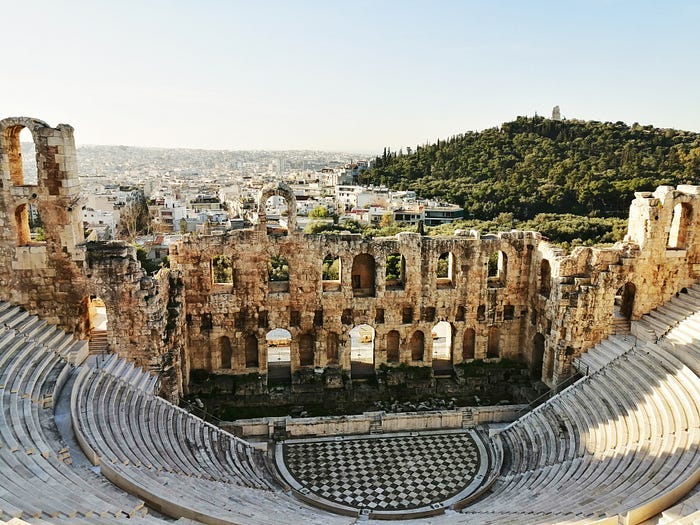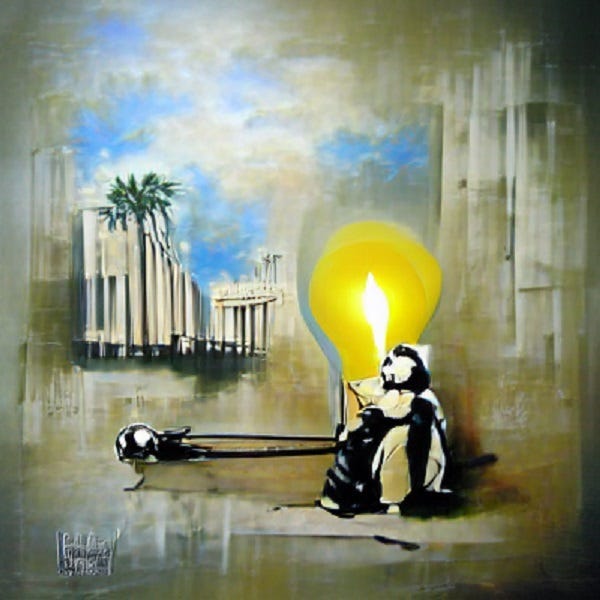Meraki: An Ancient Greek Secret For A Rich Life
The concept of creative value can solve modern society’s lack of meaning

Meraki (µεράκι): to do something with complete passion and love, usually associated with a task or creative endeavor.
— India Doyle, Culture Trip
Modern society is obsessed with the idea of finding meaning in life. Although we often disguise it with other words. Some use fulfillment or happiness. While others use some form of the word goal or destination.
We’ve even created a word showing the destructive power of a life without this meaning: nihilism.
It’s also no coincidence one of the most read books of all time is called Man’s Search For Meaning. As of 2006, it sold more than 16 million copies and has been translated into 50 languages. Obviously, its author Viktor Frankl has some keen insight into the issue.
He believes modern society has lost its base traditions which usually pointed the path to a proper life. It’s also become very automated and machine-like. This results in a longing for meaning or an “existential vacuum,” which humanity tries to fill with whatever they can — often destructively.
But a few ancient cultures had this already figured out, namely the Greeks. Their solution required no money or technology we’d recognize. It focused on the idea humans are creators by nature and are most fulfilled when doing just that.
They found this meaning in meraki (may-rah-kee) or passionate creativity. Think of the concept of “labor of love,” but deeper because the “labor” isn’t considered laborious.
Even if this activity is difficult, you find happiness and meaning in it. You put a piece of yourself within. So, this creativity fills the vacuum.
If you look closely, you notice it comprises major pieces of ancient Greece, plus it’s also present within another long-lived culture on the other side of the planet.
Passionate Creativity In Ancient Greece
Professor Angus Fletcher in his book Wonderworks mentions Aristotle came to a shocking discovery, which proved his teacher Plato wrong. The sage said a special power came from reason. He called it a “soul lifter,” and it could only be found in the logic derived from philosophy.
But Aristotle found it somewhere else: the theater.
He noticed tragedies, dramas, and comedies did the same thing in the audiences watching. Wonder filled them and lifted their souls.
Our terms tragedy, drama, and comedy come from ancient Greece. Fletcher refers to them as a “technology.” But if you think about it logically — as Plato would — this makes no sense. Theater is a technology?
It can be when you apply the concept of meraki.
That passionate creativity — not money, fame, or power — drew actors, writers, and audiences themselves to the large amphitheaters throughout the Greek world. As Aristotle might point out, the meraki lifted their souls.
But it’s not only in the theater, the Greeks also created the Olympics. Again, from a cold logic standpoint, it makes no sense. Why would you invest so many resources into games?
Well, they were more than just games.
They were difficult — requiring work, and submission to training regimens — but the athletes found meaning that made the stresses worth it: meraki. It lifted their souls, in addition to the spectators.
You also see something similar in another ancient culture oceans away.
Finding Love And Meaning In The Mundane
The Japanese word Monozukari doesn’t translate well to English. We’ll refer to it as craftsmanship. But it goes so far beyond this, it can only be explained by example.
While on a trip to Japan, Christoph Roser discovered a strange collection of people who found a shampoo bottle fascinating. The inflight movie was about this bottle. The makers proudly showed it off with its ergonomic design based upon an ingenious origami concept.
To Roser, it was a shampoo bottle, but to the design team it was their epic Mona Lisa. But this extends beyond hair products. In Japan you just don’t write on a chalkboard, it’s an artform called “bansho.” Every idea gets a different color and the board is spaced elaborately for collecting thoughts.
Japan Intercultural Consulting also notes some Japanese electrical companies have ceremonies thanking prototype materials for their service. So, Monozukari puts the emphasis on the “thing” being created, not the creator. This creation is also treated with a deep reverence.
Hence, even making a shampoo bottle is meaningful and done with love, much like meraki. But Monozukari isn’t unique in Japan, they also have a concept called shugyō.
This refers to a never-ending skill you practice throughout your life, which makes you a better person. Similar to the way a swordsmith polishes a katana into a brilliant luster, you polish your soul the same way through practice of this skill.
While the Greeks had theater and the Olympics, the Japanese found creative meaning in flower arranging, archery, calligraphy, and the sword art kendo.
Creative Value Fills Our Vacuum

Earlier I noted Man’s Search For Meaning is one of the most read books of all time for a reason. Similarly, it’s no coincidence the concept of meraki appears in two different ancient cultures on opposite sides of the globe.
While they use different words, the inherit meaning is the same.
Frankl may be correct that modern people suffer from an “existential vacuum” due to the loss of traditions and a machine-like world, but our ancestors left us a gift to fill this empty space.
Humans are creators. If you’ve ever had a sudden sense of satisfaction after you built or put something together, you know this is innately true.
So, the secret to our lack of meaning and sense of emptiness is to create. But not just blindly assemble, create with a passion and love where we leave a piece of ourselves within.
Call it meraki, monozukari, shugyō, or whatever you like, but create something with your whole self. Money and fame aren’t necessary. As our brilliant ancestors have shown us, creative value can fill the largest gap, and close any existential vacuum.
Ultimately, the concept of creative value can solve modern society’s lack of meaning and help us find the rich life our ancestors once lived.
-Originally published on Medium 1/26/2022


